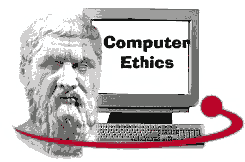Ethics and Law

Laws in general govern the acts of humans. In school our actions are controlled by rules enforced by school administrators
Laws can be:
Written or unwritten
Formal or informal
Rigid or flexible
e.g the New Constitution of the Philippines is an example of a Written, formal and rigid type of law
Law, in its widest and most comprehensive sense, refers to an ordering principle of rule of action that people must obey or conform to.
Laws are rule of consecution, or an order of sequence, that people cannot counter without detrimental consequences. Any deviation or departure from law is subject to punishment or condemnation.
As a rule of action, the law pertains to any regulation, precept, and measure or precedent that governs any human concern act or conduct, contract or transaction and proceedings, inclusive of their effects
Applying the above to computing, the following would be examples of rules of action:
Law on IP
Law governing freedom of expression
Statutes and laws promulgated by Congress
Pres. Decrees and Republic Acts
Code of conduct or Ethics governing professionals within a particular field or profession
Rule of Action does not lose its validity by mere violation or even by repetitive transgression.
Laxity in enforcement of non-implementation of law will not affect its efficacy and validity.
As an order of sequence, law pertains to systematic arrangement or sequencing of consecutive progression indicating uniformity of a given set of occurrences
Example of order of sequence
Computer Programming procedures
Computer Applications
There are different kinds of laws. Two general categories are jural and non-jural laws
4 Kinds of Non-jural Laws
Divine Law
Pertains to the entire system of faultlessness and perfection that God has initiated to govern the whole of creation, both living and non-living.
All other laws would fall under the divine law as it encompasses and governs not only human action but the whole universe as well
It encompasses the dogmas of religious faith that give empphasis on the reparation of sins and salvation of life.
As a rule of action, Divine law is absolute
Natural Law
Unwritten law permeating and governing nature as a rational harmony and orderly pattern of different things and events without which the latter would be reduces to chaos and disarray.
It is not merely legal law because what is legal may not be naturally just. It is likewise absolute (Plato)
The precepts of natural law are righteousness, justice, equity and fairness. From these precepts the laws that govern in computing is derived. E.g. piracy, pornography
Moral Law
The precepts of this law include goodness, and virtuous conducts
Consists of moral norms that ascertain and dictate what sort of behavior or conduct may or may not be expressed. What sort of acts may or may be performed within a particular community.
Generally recognized as the desirable ethical norms and principles based on good and virtuous conduct that governs human actions
Example of human actions in computing that are compliant to the moral law
Respect for others privacy and Intellectual rights
Fidelity in the using information
Honestly in the sharing of information
Integrity in creating computer programs
Condemnation of computer crimes and abuses
Physical Law
Known as “Law of Nature” but sometimes confused with natural law because on their correlation with ordering sequences and uniformities of distinct things and occurences that are relied upon as being constant and regular
Characterized by regularity and imperativeness. Regular because once it become operative, its efficacy remains constant and unbreakable. Imperative because it is permanent and unchangeable
Without constancy, regularity, uniformity and imperativeness, an occurrence or corporeal phenomena cannot be regarded as physical law of a law of nature



0 Comments:
Post a Comment
<< Home